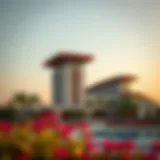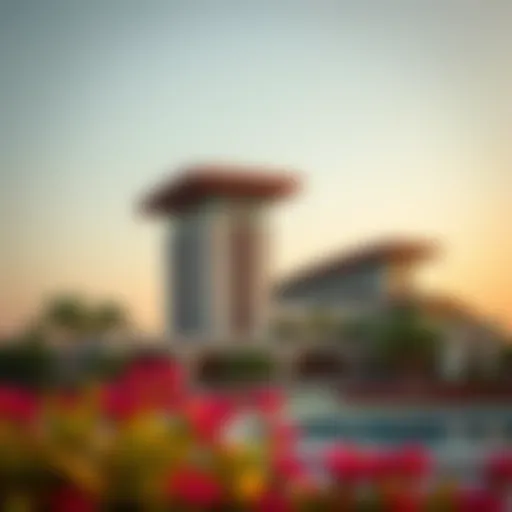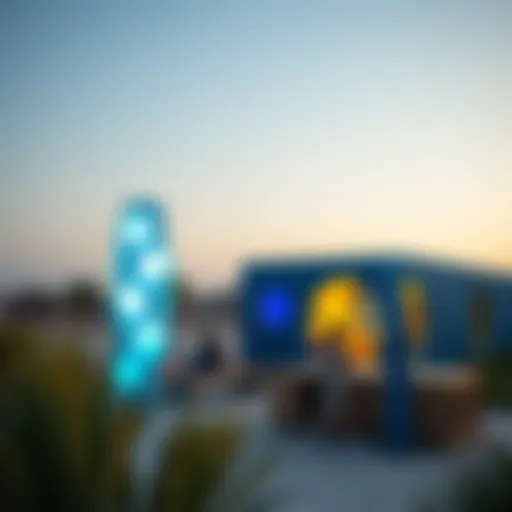Discover Iftar Dining Experiences in Dubai
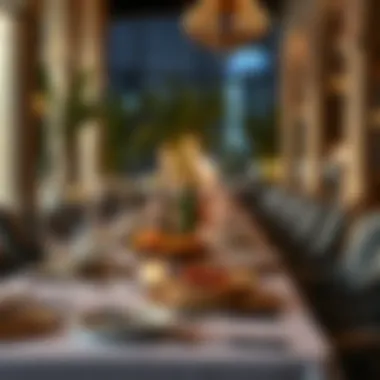

Intro
As the sun sets during Ramadan, the city of Dubai transforms into a vibrant hub of culinary activity, where the age-old tradition of iftar takes center stage. This sacred meal, marking the end of daily fasting, offers more than just a chance to satiate hunger; it serves as a cultural thread that weaves together family, friends, and the community.
Dubai, known for its fusion of the traditional and modern, boasts a diverse array of dining locations that cater to all tastes and preferences. Whether you're craving classic Middle Eastern fare or seeking international cuisine, the iftar scene in this bustling city has something for everyone. The key is finding the right spot that aligns with your taste, ambiance preference, and budget.
The purpose here is to explore various iftar places while shedding light on their unique offerings, cultural significance, and the overall dining experience they provide. The guide aims to help visitors and residents alike navigate the myriad of choices available during this holy month, showcasing not just extraordinary food, but also the rich tapestry of traditions that make iftar a cherished event in Dubai.
From elegant hotel buffets to cozy eateries, and lavish rooftop lounges, this guide is structured to highlight essential elements of the iftar experience, emphasizing what sets each location apart. Moreover, insights into current dining trends, traditional practices, and accessibility considerations will provide readers with a comprehensive understanding necessary to make informed dining choices in Dubai during Ramadan.
Intro to Iftar
Iftar is more than just a meal; it's a profound cultural experience marking the end of the daily fast during Ramadan. This tradition acts as a bridge, connecting the spiritual and the social. As the sun dips below the horizon, families and friends come together, emphasizing unity and community. In Dubai, the iftar gatherings take on a unique character, shaped by its multicultural society and culinary diversity. Understanding this significance will immerse you in the vibrant fabric of local customs during this holy month.
Cultural Significance
Iftar holds immense cultural value in the Islamic faith, symbolizing not only the breaking of a fast but also the onset of gratitude and reflection. It's a time dedicated to spiritual cleansing and reconnecting with family and friends. It's not just about consuming food; it’s about sharing meals, experiences, and traditions. This aspect of togetherness signifies the core of Ramadan, where all barriers fall, and conversations flow freely.
The variety of iftar meals across different cultures reveals the rich tapestry of traditions. Each dish tells a story, often passed down through generations. In places like Dubai, it infuses local flavors with international influences, creating unique combinations that reflect its diverse population. Traditional dishes can be found alongside modern interpretations, highlighting the evolution of culinary practices in this ever-changing city.
Understanding Iftar Customs
While the act of breaking the fast might seem uniform, the customs surrounding iftar vary significantly across different cultures and regions. In Dubai, the quintessential break of fast usually starts with dates and water, following the Sunnah of the Prophet Muhammad. After this, the feast can be as lavish as a royal banquet or simply a humble gathering at home. Typically, families and friends gather around tables laden with food, each dish inviting stories and conversations.
Another interesting aspect is the communal nature of iftar meals. Many establishments offer special iftar buffets, inviting the community to dine together. This initiative fosters a sense of belonging among people from diverse backgrounds. Just within Dubai, some places extend this hospitality beyond the Muslim community, encouraging everyone to partake in the joyous occasion regardless of their faith.
The decorations and ambiance during iftar also add to the experience. Many restaurants and homes are adorned with twinkling lights, ornate table settings, and traditional music, which contribute to the festive atmosphere. Such details not only enhance the dining experience but also reflect the importance of this occasion in maintaining cultural heritage.
In summary, the introduction to iftar paints a vivid picture of cultural significance, deep-rooted customs, and the notion of community. Whether you're a resident or a visitor, grasping the essence of iftar brings deeper insight into Dubai's rich tapestry of tradition during the month of Ramadan.
Types of Iftar Places
When it comes to experiencing iftar in Dubai, understanding the different types of dining venues available is key. Each category offers a unique flavor, both literally and metaphorically. As those observing Ramadan break their fast, the setting and style of dining can significantly enhance the experience. Not only can it cater to varying preferences, but it also reflects the multicultural nature of Dubai itself.
Traditional Restaurants
Traditional restaurants hold a special place in the hearts of many during Ramadan. They often serve authentic Emirati dishes, prepared in accordance with family traditions and local customs. For example, a meal might feature Thareed, a hearty stew of lamb or chicken layered with bread, or Harees, a wheat and meat dish cooked until the texture is creamy. The recipes are often passed down through generations, giving diners a real taste of the heritage.
Patrons can enjoy not just the food but also the decor, which frequently showcases local art and craft. The ambiance is typically warm and inviting, making it a perfect spot for family gatherings. Some places even host live cooking stations, allowing diners to see their meals being prepared right in front of them.
Having a meal at a traditional restaurant often provides a sense of continuity with the past, offering an immersive experience that goes beyond just eating.
Buffets and Banquets
For those who can’t decide on just one dish or simply want to enjoy a variety of flavors, buffets and banquets are excellent choices. Many hotels in Dubai pull out all the stops during Ramadan, setting up lavish spreads that could make anyone’s mouth water. These venues often boast an astounding range of cuisines, from Middle Eastern delicacies to Asian fusion dishes.
A key advantage of these setups is the flexibility they offer. Diners can sample small portions of numerous dishes, creating their own custom platters. It’s not uncommon to find segments dedicated to desserts like Knafeh, a cheesy pastry soaked in syrup, or other sweets that are hugely popular during Ramadan.
Moreover, buffets create a social atmosphere; families and friends can gather, share stories, and create memories as they break bread together. There’s a certain camaraderie formed when everyone dives into the food together—an event more celebratory than mealtime.
Cafes and Lounges
On the more casual side, cafes and lounges provide a relaxed vibe to the iftar experience. They often serve lighter fare but don’t skimp on flavor. Options could include a variety of appetizers to share, refreshing salads, and traditional drinks like Qamar al-Din, made from apricot juice.
These spots are perfect for those looking to unwind after a long day of fasting. The laid-back atmosphere allows for deep conversations and socialization without the formality found in traditional dining. Many cafes also provide outdoor seating with views of the sunset, a beautiful backdrop when breaking the fast.
In recent years, some cafes have incorporated modern twists to traditional dishes, appealing to a younger crowd. Samosa chaat and sushi rolls with a Middle Eastern flair are excellent illustrations of this innovative approach. The added creativity might just surprise you.
Overall, whether opting for a traditional feast, an elaborate buffet, or a casual gathering at a cafe, each type of iftar place in Dubai contributes something unique to the experience of Ramadan. No matter which option one chooses, it surely remains a time of connection, sharing, and celebration of culture.
Top Iftar Locations in Dubai
When the sun dips below the horizon during Ramadan, the anticipation in the air heightens. Iftar, the evening meal that breaks the fast, transforms Dubai into a tapestry of flavors, aromas, and cultural expressions. It’s more than just a meal; it’s a united experience, a moment where family and friends gather to celebrate resilience and tradition. This section sheds light on the prime locations where you can immerse yourself in the Iftar culture that Dubai offers. Whether you’re seeking a lavish buffet or a cozy nook, knowing these top spots can enhance your experience. Exploring these venues not only satisfies one’s appetite but also enriches one’s understanding of Ramadan customs and local culinary arts.


Downtown Delights
In the heart of the city, Downtown Dubai is a melting pot of modernity and tradition. Here, the skyline tells a story, but the culinary offerings during Iftar are equally compelling. From luxurious hotels to upscale restaurants, these venues whip up an array of dishes that are as aesthetic as they are appetizing. For instance, many dining establishments here serve an extensive buffet, showcasing international flavors along with local specialties like lentil soup and dates.
"For many, dining in Downtown during Ramadan is akin to being in the city's heartbeat—where modern architecture meets rich heritage."
You'll find places like At.mosphere, perched in the Burj Khalifa, providing stunning views alongside delightful dishes. Another spot, The Dubai Mall's Food Court, offers fast-casual dining for those on the go, yet craving authentic flavors. The energy and ambiance here create a communal vibe as families and friends gather to break their fast together.
Coastal Dining Experiences
If ocean breezes and sunset views are more your style, then consider the coastal dining scene in Dubai. Along the pristine shores, several restaurants offer Iftar spreads with a view that is second to none. Places such as Zheng He’s provide a unique mix of Chinese and Middle Eastern cuisines, allowing diners to expand their palates.
These coastal spots often adapt their menus to include traditional Iftar delicacies while ensuring that the seafood remains a highlight. Fresh catch of the day is showcased in various formats, from grilled to spiced. Achieving a balance between rich flavors and refreshing coastal air, diners can savor dishes like grilled lamb kebabs alongside fresh salads. Enjoying Iftar in a setting overlooking the endless horizon can evoke a sense of tranquility and reflection; perfect for whipping up an immense feast.
Authenticity in Old Dubai
To feel the historical heartbeat of Dubai, one must venture to Old Dubai. Areas like Al Fahidi Historical Neighborhood are not just visually captivating but also filled with culinary treasures that stay true to local traditions. Here, small eateries serve recipes passed down through generations. Meals are often abundant, with dishes served family-style, encouraging sharing and connection.
A specific mention goes to Al Ustad Special Kebab, a beloved spot among locals. It’s modest in appearance, yet the flavors it offers encapsulate what homemade Iftar is all about. From savory kebabs to the sweet caress of baklava, each bite opens a window into a time-honored culture.
Moreover, the bustling markets nearby fill the air with scents of spices, reinforcing the experience of dine-in traditional settings that Dubai’s heritage prides itself on. For anyone looking to immerse themselves fully in Arab culture, breaking fast here is a must-do.
Menu Highlights
When exploring iftar dining options in Dubai, the menu highlights stand front and center. Food is at the heart of iftar, nurturing both body and spirit after a day of fasting. This segment is crucial for discerning diners looking to delve into Dubai’s rich culinary tapestry. Thoughtful selection, presentation of dishes, and consideration of local flavors matter significantly when curating the iftar experience.
Diners should find that an exquisite menu not only reflects traditional dishes but offers a bit of innovation too. This balancing act between honoring heritage and modern tastes creates a unique dining experience. Moreover, menu highlights serve as a practical guide, helping to navigate the diverse offerings available across the city.
Traditional Dishes
Traditional dishes will always have a special spot on the iftar table. They connect individuals to their heritage and families, evoking cherished memories of Ramadan gatherings. Iconic dishes like dates, lentil soup, and biryani are staples, each carrying its own story and significance.
- Dates: Traditionally, breaking the fast begins with dates, which are packed with nutrients and offer a quick energy boost.
- Lentil Soup: This familiar dish represents warmth and comfort, often flavored with local spices and herbs, giving it a distinct Middle Eastern flair.
- Biryani: A fragrant rice dish layered with spiced meat or vegetables, biryani varies from household to household, reflective of familial traditions.
The emphasis on using fresh, seasonal ingredients enhances the authenticity and flavor of these dishes. It’s not just about filling the belly; it's a sensory journey that speaks volumes about the culture. Sharing these meals not only nourishes the body but also cultivates bonds, reminding us that the spirit of Ramadan thrives in togetherness.
Modern Twists on Classics
While traditional dishes hold much allure, many restaurants in Dubai don’t shy away from putting a modern spin on classics. The culinary landscape has evolved, and offerings now include creative interpretations that entice the palate and surprise diners.
For instance:
- Kale Fattoush: A fresh twist on the classic fattoush salad includes kale instead of traditional greens, offering a nutrient-dense option that still captures the essence of the dish.
- Quinoa Tabbouleh: Here, quinoa replaces bulgur wheat, appealing to health-conscious diners while maintaining the dish's vibrant flavors.
- Saffron-infused Chicken Wings: A mash-up of global flavors introduces saffron in a dish usually reserved for barbecues, lending a luxurious touch to a casual favorite.
"Innovation in culinary traditions does not dilute their essence, but rather, creates new connections and celebrates diversity in taste."
These modern twists are not just about introducing new flavors; they reflect the dynamic nature of Dubai’s cosmopolitan society. Whether one prefers the comfort of tradition or the excitement of modernity, the iftar menu in Dubai promises something for everyone, ensuring that every meal can be a delightful exploration.
Ambiance and Experience
The ambiance and experience surrounding iftar dining in Dubai play an essential role in shaping the overall enjoyment of this cherished meal. Many consider this time as a moment not only to break fast but also to connect with friends and family. The setting can make or break this special occasion. From lavish interiors to cozy nooks, every aspect contributes significantly to the mood and quality of the dining experience.
A well-thought-out atmosphere can enhance the flavor of the dishes served, almost elevating them to a more tantalizing level. It’s about weaving culture into every moment; after all, eating is never just about the food in this context. The right surroundings encourage conversations and foster intimacy, which forms an intrinsic part of the tradition.
Throughout Dubai, there’s a variety of options presenting unique themes, making it easy for diners to find a place that resonates with their personal tastes and preferences—a key consideration when planning an iftar out.
Interior Design and Theme
When one walks into an iftar venue, the first impression is often driven by the interior design and theme. Traditional aesthetics are prevalent in many establishments, reflecting the cultural richness of the region. For instance, restaurants adorned with intricate arabesque patterns, golden hues, and low-hanging lamps offer a direct link to the heritage of the UAE.
Conversely, some places opt for a more modern twist, integrating contemporary furniture with ethnic decor elements. This blend attracts not just locals but tourists eager to experience the fusion of old and new. A themed restaurant, such as those with interiors reminiscent of traditional markets or even the desert, creates a unique backdrop that elevates the dining experience significantly.
An important point to consider is the overall comfort provided by the seating arrangement. Cozy booths can inspire quiet reflection, while communal tables invite conversation and connection. Whatever the design choice, it’s vital that the space fosters a welcoming environment. Accessories like lanterns and fresh flowers can help achieve that inviting atmosphere.
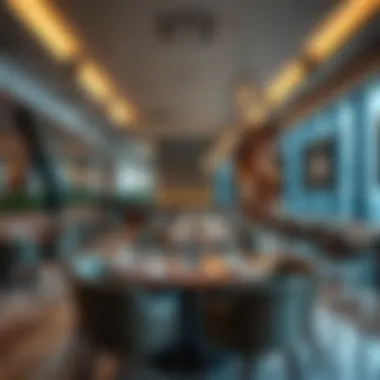

Outdoor and Rooftop Options
Outdoor and rooftop dining options present a delightful twist to iftar meals, particularly in the cooler evening hours. With the warm Dubai weather, enjoying a meal under the stars can be nothing short of magical. These venues often provide a stunning view of the skyline or the serene waters of the Arabian Gulf, which adds a layer of beauty to the dining experience.
“Dining outdoors during Ramadan combines the sacred act of iftar with the enchanting ambiance of the Dubai skyline.”
Many places feature open-air seating that encourages diners to immerse themselves fully in the natural surroundings. The gentle evening breeze, combined with the fragrant aromas wafting from nearby kitchens, can create a sensory experience that one wouldn’t want to miss.
Some rooftop locations offer beautifully designed lounges with dedicated iftar menus, often prepared by top chefs. This offers a blend of culinary excellence and stunning views. During this holy month, these spots may also include special decorations to mark the occasion.
In summary, the ambiance and experience of iftar dining in Dubai are far more than just the food on the table; it is a multifaceted approach that encompasses design aesthetics, comfort, and the surrounding atmosphere, making it an enveloping experience that resonates deeply with the community.
For more insights into dining options, you can explore resources such as Wikipedia or visit local forums on Reddit for recommendations.
Making Reservations
When exploring the vibrant offering of Iftar places in Dubai, making reservations is not merely a recommendation, it’s a necessity. The sheer popularity of dining out during this special month means that popular spots can fill up quicker than you can say "Eid Mubarak." As the sun sets and the call to prayer echoes, families and friends flock to these dining establishments, creating a buzz of excitement and a challenge for the unprepared.
One of the primary benefits of reserving your spot in advance is the peace of mind it brings. Imagine arriving at a bustling restaurant only to find there’s a long queue, or worse, that it's fully booked. Your plans can turn from joyful anticipation to disappointment in seconds. By securing a table ahead of time, you’re avoiding that scenario. You can also take your time enjoying the meal with the people that matter to you, without the stress of rushing.
Moreover, some places offer special iftar deals exclusively to those who reserve early. From complimentary drinks to discounts on buffet prices, those flashy offers can really sweeten the deal. These added incentives make it all the more worthwhile to plan ahead.
To dive deeper into the topic, let’s break it down into two crucial aspects:
Timing and Availability
Timing is everything during Ramadan, especially when it comes to Iftar dinings. Many restaurants adjust their hours to accommodate the fasting schedule, and understanding these changes is essential.
- Booking Early: Start planning your Iftar by making reservations as soon as you can. Some restaurants open their reservations at the start of the month, and securing your place soon helps avoid those last-minute scrambles.
- Peak Times: The hour right after Maghrib prayer is typically packed. If you can, aim for a reservation a bit earlier or later, which might land you a calmer dining experience.
- Check for Special Events: Some restaurants also offer themed nights or guest chefs during Ramadan. Being aware of these unique offerings can help you choose where to dine on specific days.
As demand spurs, availability diminishes. Reserving your table in advance can take away the uncertainty, making your experience smoother.
Online Booking Systems
As we live in an age of technology, online booking systems have become essential players in securing your Iftar experience. Many establishments have made the reservation process effortless through mobile apps or their websites.
- User-Friendly Platforms: Most online booking platforms have slick, user-friendly interfaces. You can simply select the date and time, view available tables, and lock in your reservation without needing to pick up the phone or stand in line.
- Rate and Review: Platforms like TripAdvisor or Zomato allow you to see reviews, star ratings, and even photos from previous guests. This option can help you make an informed decision based on the experiences of other diners.
- Adjustments and Cancellations: With the ability to make reservations online, adjustments like moving your reservation or cancelling when necessary—often without penalties—become a lot easier.
"Booking online is like having a seatbelt on during your iftar journey—safety first!"
Health and Safety Considerations
When dining out during Ramadan in Dubai, especially for iftar, health and safety considerations can’t be overlooked. After all, the enjoyment of culinary delights should never come at the expense of wellbeing. This section delves into the significance of maintaining high standards in both food safety and hygiene practices during this sacred month.
Food Safety Standards
Food safety is crucial in handling and preparing meals, particularly when large quantities are involved as is often the case during iftar. Not only does food safety ensure the meals are safe to eat, it also upholds the integrity of the dining experience. Let's explore some key aspects:
- Temperature Control: Food must be stored and served at appropriate temperatures to prevent bacterial growth. Hot foods should stay hot, while cold items need to remain chilled.
- Fresh Ingredients: Restaurants are encouraged to source fresh ingredients daily. Not only does this enhance flavor, but it also minimizes the risk of foodborne illnesses.
- Proper Cooking Procedures: Thorough cooking is essential, especially for meats and seafood. This reduces the chance of harmful bacteria surviving in the food.
In Dubai, many esteemed dining establishments comply with international food safety standards. They receive regular inspections from local authorities, ensuring that the eating spots maintain these guidelines. The typical diner might not understand the rigorous checks behind the scenes, but it’s comforting to know that many of these places are held to such standards.
Hygiene Practices During Ramadan
During Ramadan, when people often gather for communal iftar, hygiene practices become even more critical. Maintaining cleanliness across the dining space fosters a healthy environment. This section outlines what to look for:
- Staff Training: Restaurants should provide proper hygiene training to their employees. This includes the importance of hand washing, proper handling of food items, and avoiding cross-contamination.
- Cleaning Protocols: Establishments are required to follow intense cleaning schedules, especially in areas where food is prepared and served. Surfaces must be sanitized thoroughly to prevent any bacteria from lingering.
- Personal Hygiene of Staff: The appearance and cleanliness of staff can indicate how seriously an eatery takes hygiene. Employees who are well-groomed and follow hygiene protocols contribute to a positive dining experience.
"Health and safety aren’t just a priority; they are a sign of respect for the diners and the culinary traditions of iftar."
By being vigilant about these practices, restaurants can reassure patrons that their health is a priority. As diners, being mindful of these considerations enhances the experience, allowing individuals to focus more on the joy of gathering and breaking their fast rather than worrying about potential risks.
Catering to Diverse Preferences


Choosing where to break the fast during Ramadan is not just about filling one's belly after a long day of fasting; it’s also about catering to various preferences and dietary restrictions. This makes it essential to explore diverse options available for iftar meals in Dubai. Here’s what to know regarding this multifaceted topic.
Vegetarian and Vegan Options
Dubai's culinary landscape has evolved significantly over the years, and it now proudly includes a spectrum of vegetarian and vegan choices suitable for iftar. Even though traditional iftar often features meat-heavy dishes like lamb and chicken, many restaurants have started to embrace plant-based alternatives, offering an inclusive dining experience for everyone.
The Benefits of Vegetarian and Vegan Iftar
- Health Consciousness: Vegetarian meals are generally lighter and healthier, making them a welcome option after a long day of fasting.
- Cultural Inclusion: Offering vegetarian and vegan options ensures that those who abstain from animal products can partake in the same communal experience as others.
- Environmental Impact: With growing concerns about sustainability, plant-based dishes can help mitigate one’s carbon footprint.
When opting for a vegetarian or vegan iftar, consider places like Wild and the Moon, which specializes in healthy, organic plant-based meals. Their vibrant dishes, such as a quinoa salad or roasted vegetable plates, provide a delightful feast that appeals not only to vegans but meat-lovers alike.
Gluten-Free Choices
The need for gluten-free options has also gained recognition, catering to those with health concerns like celiac disease or gluten sensitivity. In Dubai, where gastronomy is taken very seriously, many upscale restaurants have begun offering gluten-free iftar menus.
Key Considerations for Gluten-Free Dining
- Cross-Contamination Awareness: It’s crucial that restaurants not only offer gluten-free items but also do so in a controlled environment to prevent cross-contact.
- Variety of Choices: Gluten-free does not mean flavorless. The market is now teeming with creative gluten-free dishes both traditional and modern, such as gluten-free rice tabbouleh or spiced lentil balls.
- Transparency in Menu: Look for places that clearly label their gluten-free items. A good example is Bistro Desert which features a selection of gluten-free desserts like coconut macaroons that satisfy sweet cravings without causing any distress.
"Catering to dietary needs is not merely an option but a necessity that enhances the communal spirit of Ramadan."
In summary, the inclusion of vegetarian, vegan, and gluten-free offerings during iftar allows not just for variety, but for a shared experience among diverse dietary preferences. The essence of iftar is to foster togetherness and understanding, ensuring that everyone can enjoy this special meal, regardless of their lifestyle choices.
Feedback and Reviews
Feedback and reviews carry a weighty significance in navigating the culinary landscape of iftar places in Dubai. The experiences shared by fellow diners not only inform potential visitors but also shape the reputation and sometimes even the menu offerings of these restaurants. It is no exaggeration to say that in the digital age, a single glowing review or a critical comment can sway hundreds of diners. So, why is this so important?
- Building Trust: Consumers are more inclined to visit an establishment that comes highly recommended. A series of positive reviews creates a sense of trust, assuring diners that the restaurant delivers on its promises.
- Insight into Authenticity: Personal experiences shared in reviews offer insights into the authenticity of the cuisine being served. Diners often narrate whether the flavors match the traditional dishes they might expect.
- Identification of Trends: Many readers lean towards discovering new options based on what's trending in the culinary space. Reviews often highlight new twists on traditional dishes or unique offerings available during Ramadan.
Given the multitude of options available for iftar in Dubai, utilizing feedback and reviews can elevate the dining experience from ordinary to extraordinary.
How to Choose Based on Experiences
When considering where to break your fast, it’s key to sift through experiences that resonate with your personal preferences. Here are several factors to consider:
- Cuisine Type: Look for specific mentions of dishes that delight the palate. If a restaurant is praised for its samosas or hummus, it might be a sign that these are worth trying.
- Service Quality: Guests commonly highlight the hospitality they feel is significant during Ramadan. Pay attention to comments about staff attentiveness and their knowledge of the menu.
- Atmosphere: Reviews frequently touch upon the ambiance. Cozy corners or chic rooftop views may determine whether you feel comfortable and at ease with your dining experience.
By focusing on these elements, making an informed choice becomes less daunting, guiding you toward a delightful iftar.
Use of Social Media for Insights
Social media plays a colossal role in shaping opinions today, especially within the foodie community. Platforms like Facebook and Instagram serve as vibrant arenas for exploring iftar options. Here’s how you can leverage it:
- Visual Appeal: Photographs of beautifully presented dishes can offer far more than words. A plate of fragrant biryani or a colorful array of dates can tempt anyone’s taste buds.
- Influencer Recommendations: Many food bloggers and influencers have their pulse on the latest dining innovations. Their reviews can facilitate quick decision-making and highlight places you might not have discovered otherwise.
- Real-time Updates: Social media also provides a format for discovering specials and promotions specific to Ramadan. Restaurants often post updated menus or exclusive iftar deals, ensuring your experience is both cost-effective and satisfying.
In essence, feedback and reviews serve as the backbone for dining choices, while social media acts as a powerful amplifier, melding personal experiences with a broader community sentiment.
Finale
As we wrap up this exploration of iftar dining in Dubai, the importance of this experience cannot be overstated. Iftar, a time where families and friends gather to break their fast, serves as a window into the culture and culinary diversity that is central to Ramadan. This article has delved into various facets—menu highlights, ambiance, and the different types of restaurants that cater to both traditional tastes and modern cravings.
From luxurious buffets that tantalize the palate with a mix of local and international cuisines to quaint cafes offering heartwarming atmospheres, the choices are as rich as they are varied. Here are some core elements to consider when diving into the iftar scene:
- Cultural Immersion: Participating in iftar is not just about food; it’s about experiencing communal tradition, togetherness, and hospitality.
- Diverse Offerings: Dubai's culinary landscape during Ramadan features everything from classic Arabic dishes like Dates and Harees to innovative fusion plates that cater to international palates.
- The Ambiance: The atmosphere of an iftar setting is pivotal. Whether it’s a stunning rooftop view overlooking the skyline or the coziness of a traditional setting, the experience can significantly enhance the meal.
Summarizing Experiences
To summarize the experiences brought forth in this guide, we note that Dubai's iftar scene is a blend of flavors, traditions, and social connections. Various establishments have built an identity focused not only on serving food but also on creating memories. Preparing for iftar can be an exciting venture, given that diners may find something that resonates with their preferences or cultural backgrounds.
Moreover, the narratives and feedback from those who have indulged in these culinary offerings act as both inspiration and guidance. When one is in search of the ideal iftar spot, personal accounts can illuminate the path by providing real-world insights.
The Future of Iftar Dining
Looking forward, the future of iftar dining appears bright and full of potential. As lifestyles change and the population grows, there’s an increasing opportunity for restaurants to innovate their offerings even further. We anticipate a synthesis of culinary traditions as global cuisines continue to mingle with local flavors, resulting in exciting new dining experiences.
Sustainability has also taken center stage; many establishments are moving towards eco-friendly practices. Expect to witness restaurants focusing more on ethically sourced ingredients while also paying heed to the health-conscious diner. As technological advancements unfold, digital menus and augmented reality dining experiences may soon be part of the iftar tradition, pushing the envelope on what it means to dine during Ramadan.
Ultimately, the importance of reputable dining establishments will grow, as they serve as spaces for cultural exchange and community bonding. In a city marked by diversity, the evolution of iftar dining will continue to reflect not only the culinary landscape but also the very spirit of togetherness that defines Ramadan.










